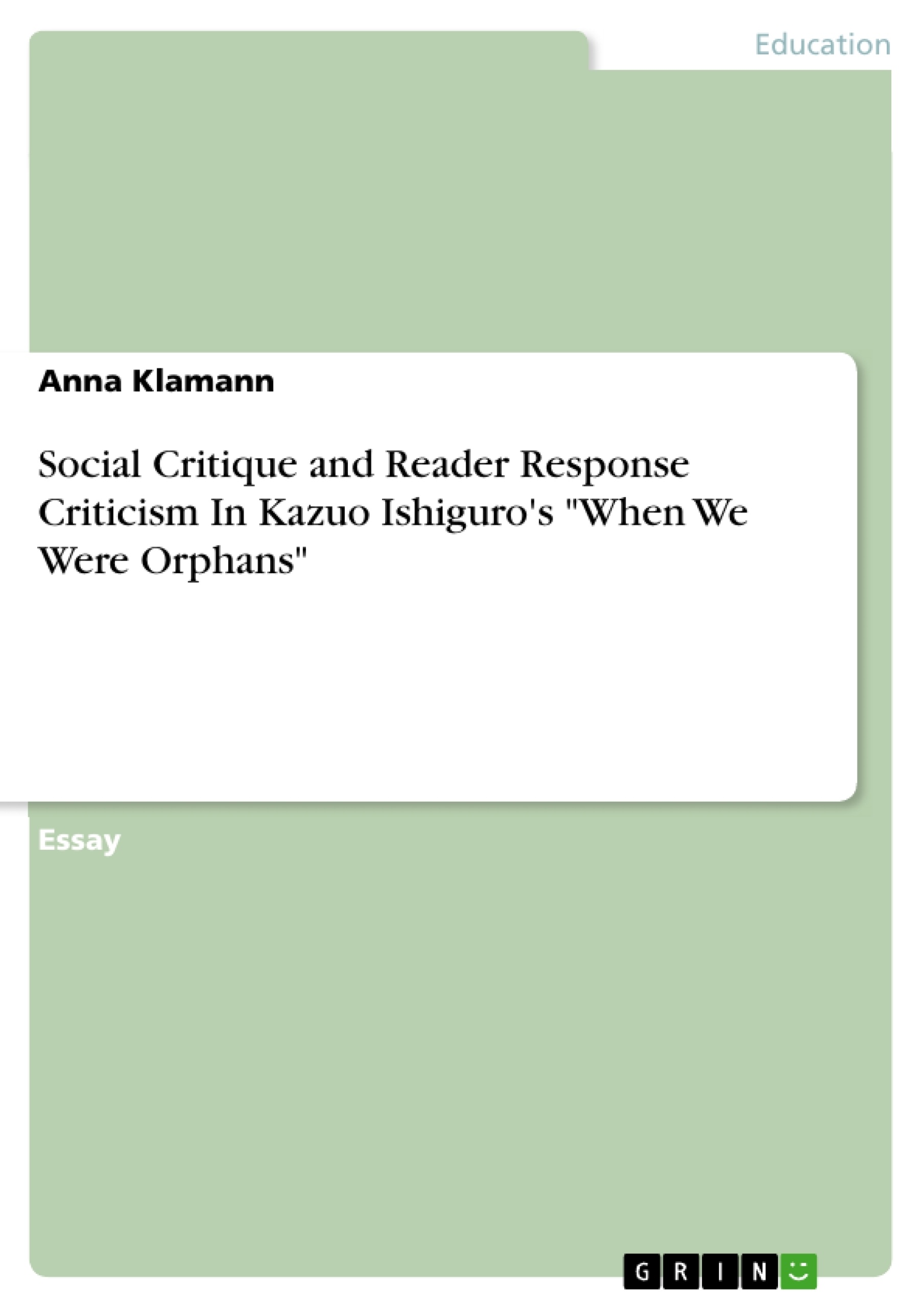In Kazuo Ishiguro's "When We Were Orphans", the surfeit labelling of Christopher Banks as a Sherlock Holmes evokes reader expectations of the Holmesian genre and lets the reader judge Banks and his methods more critically in the light of Holmes. The novel though defies reader expectations in terms of any detective formula fiction it starts to set out – but exactly those expectations and the refusal of their completion that bind Banks and the reader together.
Banks’s childhood view of what had happened to his parents mirrors the world of Sherlock Holmes and follows Banks into his adult world. It is the belief that, against all odds, a Sherlockian detective can solve the crime of his parents' disappearance. However, to make this possible the crime has to be one that equals the crimes in the world of Sherlock Holmes. As Banks adopts the personality of a Sherlockian detective because he labels himself one so does the reader expects certain personality traits because he sees this label. Banks and the reader fall into the same trap of believing that the narrative should go in a particular way because the ideas on and beliefs in detectives rely on a fixed formula.
In debunking Banks as not being a "Sherlock” the novel ridicules the believe in archetypal heroes like Sherlock Holmes and in debunking the principle of a detective itself, in the denouement chapter, it ridicules not only Christopher Banks’s life but also the reader’s expectations. Thus it is not only Banks's world that gets disenchanted but the reader’s world as well.
Inhaltsverzeichnis (Table of Contents)
- Introduction
- The Sherlock Holmes Label
- Genre Expectations
- The Detective's Assistant
- Focus on the Detective's Process
- The Early Encounter of the Crime
- The Worlds Compared
- Expecting the Reinstallment of Order
- Society's Expectations
- The Necessity of Banks's Childhood-Detective-Narrative
- Identity Deformation as Way to conform to a Sherlockian Rule
- The Ridiculement in the Denouement
- Conclusion
Zielsetzung und Themenschwerpunkte (Objectives and Key Themes)
This novel explores the complex relationship between the reader, the protagonist, and the conventions of detective fiction. It analyzes how the expectations created by the Sherlock Holmes label influence both the protagonist's actions and the reader's engagement with the narrative. By defying traditional detective formulas, the novel critiques the archetypal hero and the very concept of detective work, ultimately leading to a disillusionment of both the protagonist's and the reader's worlds.
- The impact of genre expectations on reader engagement
- The role of archetypal heroes in narrative and society
- The critique of traditional detective formulas
- The exploration of identity deformation and self-perception
- The intersection of personal trauma and detective work
Zusammenfassung der Kapitel (Chapter Summaries)
The introductory chapter establishes Christopher Banks' self-identification as a Sherlock Holmes, setting the stage for a narrative laden with expectations of detective fiction. The second chapter delves into the "Sherlock Holmes Label," analyzing how Banks' self-modelling on Holmes influences his actions and appearance. This chapter examines the reader's expectations and how they are shaped by Banks' self-perception.
The third chapter focuses on genre expectations, highlighting key conventions of detective fiction and how they are either fulfilled or defied in the narrative. The chapter explores the roles of the detective's assistant, the focus on the detective process, the early encounter of the crime, and the world of Sherlock Holmes.
The fourth chapter explores the concept of "Expecting the Reinstallment of Order," examining society's expectations of a detective and the role of Banks' childhood narrative in shaping his worldview. This chapter further explores the connection between Banks' childhood narrative and the Sherlock Holmes trope.
Schlüsselwörter (Keywords)
Key concepts explored in this novel include detective fiction, Sherlock Holmes, genre expectations, reader engagement, identity deformation, archetypal heroes, narrative conventions, and disillusionment.
Frequently Asked Questions
How does Kazuo Ishiguro use the "Sherlock Holmes" label in his novel?
The label is used to shape reader expectations and to critique the protagonist Christopher Banks's self-perception as a detective.
What is "Reader Response Criticism"?
It is a school of literary theory that focuses on the reader's experience and how their expectations influence the interpretation of a text.
How does the novel defy genre expectations?
It sets up a detective formula but refuses to complete it, leading to a disillusionment of both the character and the reader.
What is the significance of the denouement in "When We Were Orphans"?
The denouement ridicules the belief in archetypal heroes and exposes the deformation of Banks's identity through his adherence to detective rules.
How does Banks's childhood influence his adult life?
His childhood view of his parents' disappearance mirrors the world of Sherlock Holmes, driving him to believe he can solve the crime as an adult.
- Citar trabajo
- Anna Klamann (Autor), 2014, Social Critique and Reader Response Criticism In Kazuo Ishiguro's "When We Were Orphans", Múnich, GRIN Verlag, https://www.grin.com/document/381019



